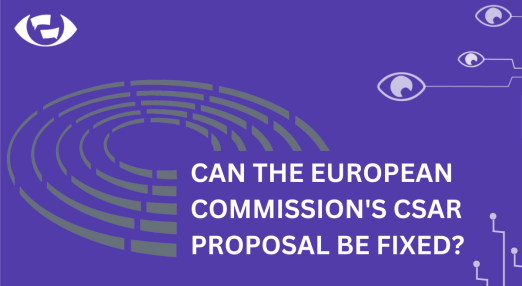France becomes the first European country to legalise biometric surveillance
EDRi member and Reclaim Your Face partner La Quadrature du Net charts out the chilling move by France to undermine human rights progress by ushering in mass algorithmic surveillance, which in a shocking move, has been authorised by national Parliamentarians.
Filter resources
-

France becomes the first European country to legalise biometric surveillance
EDRi member and Reclaim Your Face partner La Quadrature du Net charts out the chilling move by France to undermine human rights progress by ushering in mass algorithmic surveillance, which in a shocking move, has been authorised by national Parliamentarians.
Read more
-

A collective project: EDRi celebrates turning 20 in the capital of the EU
On 21 March, we celebrated EDRi 20th anniversary in Brussels, the heart of the European Union. Close friends and supporters gathered at Bozar, the Center for Fine Arts, for a fun and dynamic evening celebrating the networks's collective work for far, current efforts and a hopeful future.
Read more
-

Signal’s Meredith Whittaker voices EDRi’s concerns with the CSA Regulation
Meredith Whittaker, the President of the Signal Foundation, delivered the closing keynote speech at EDRi’s 20th-anniversary celebration in March 2023. The tech professional focused on the “recent spate of regulatory proposals and misguided tech fixes [like the EU’s Child Sexual Abuse Regulation] that offer false and surveillant solutions to complex social problems – solutions that always seem to lump the right to privacy in with malfeasance, and offer to address bad actions by eliminating privacy.”
Read more
-

Internal market MEPs wrestle with how to fix Commission’s CSAR proposal
The European Union’s proposed CSA Regulation (Regulation laying down rules to prevent and combat child sexual abuse) is one of the most controversial and misguided European internet laws that we at EDRi have seen. Whilst aiming to protect children, this proposed law from the Commissioner for Home Affairs, Ylva Johansson, would obliterate privacy, security and free expression for everyone online.
Read more
-

Health and digital rights organisations urge EU lawmakers to uphold patients’ rights in new health data law
European lawmakers must ensure patients have control over their private medical records by adding an ‘opt-in’ consent requirement for the secondary use of health data under the proposed European Health Data Space (EHDS).
Read more
-

EU-US plan offensive to legitimise police access to data, civil society responds amid growing fears – Press Release
On 6 April 2023, EDRi and 8 partners sent an open letter to the European Commission President Ursula von der Leyen and Vice President Margrethe Vestager, as well Swedish Prime Minister Ulf Kristersson. Through the letter, the organisations called out the clear and deliberate plans to disregard international human rights standards in the EU-US approaches to security in the digitalised society, in particular in regards to end-to-end-encryption.
Read more
-

The EU’s home affairs chief wants to read your private messages
The CSA Regulation, proposed by European Commissioner Ylva Johansson, could undermine the trust we have in secure and confidential processes like sending work emails, communicating with our doctors, and even governments protecting intelligence.
Read more
-

Shaping the next 20 years of digital rights in Europe
Last week we celebrated the 20th anniversary of EDRi, the European Digital Rights network, and its two decades of defending and promoting rights online and off. The digital rights movement has come a long way and we are at a crucial moment to shape our shared digital future for the better. The EU’s fundamental rights framework has been pivotal in our achievements so far, but it has never served everyone equally. How can we better equip Europe for the human rights challenges of the digital age?
Read more
-

Unprecedented appearance by European Commissioner for Home Affairs, innovating on quicksand, and the cabinet vs. online confidentiality
Read through the most interesting developments at the intersection of human rights and technology from the Netherlands. This is the second update in this series.
Read more
-

“Social media profiles and phone contacts” used as proof of identity for deportations
Thirteen non-EU countries sometimes accept “social media profiles and phone contacts” as evidence of identity for the purpose of deportations, according to an internal European Commission assessment of third country cooperation on readmission.
Read more
-

Manchester 10: Open letter asks Andy Burnham to tackle discriminatory ‘gang’ surveillance
Advocacy groups and human rights organisations have written to the Manchester Mayor, Andy Burnham, and the Chief Constable of Greater Manchester, Stephen Watson, to ask them to investigate discriminatory police practices in the wake of the conviction of ten young Black men, known as the Manchester 10.
Read more
-

Mapping the impact of biometric surveillance and social media platforms on civic space
The European Center for Not-for-Profit Law is concerned about safeguarding human rights and limiting the negative impacts of security technology on civil society. Therefore, they launched a report with partners as a step to investigate how technologies introduced in the name of security and counter-terrorism will impact civil society.
Read more
